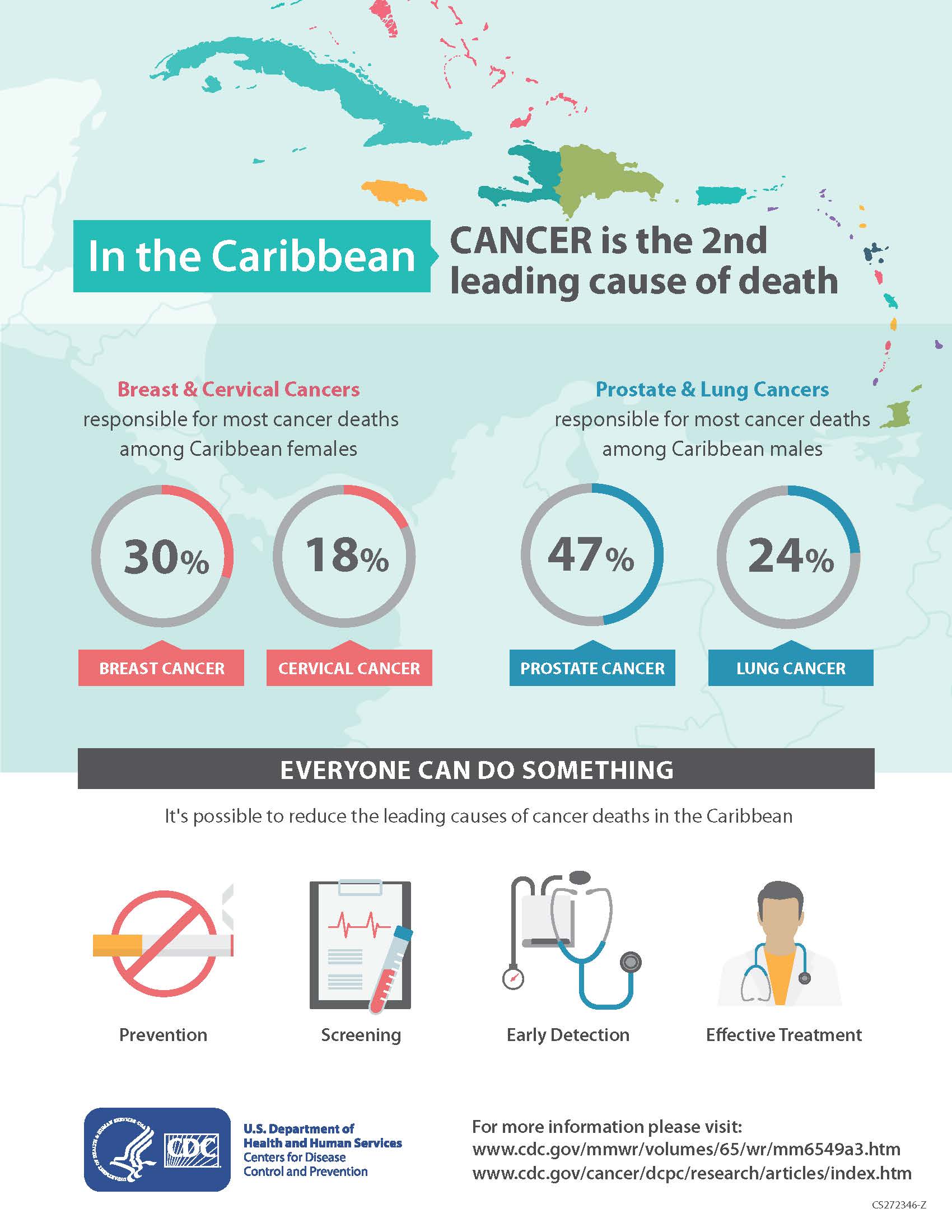
Hilda Razzaghi, Ph.D, Epidemic Intelligence Service Officer,
Centers for Disease Control and Prevention
(NAACCR Committee Member)
Cancer is a leading cause of mortality in the Caribbean region and globally; in 2012, an estimated 65% of all cancer deaths occurred in the less developed regions of the world. A recent study examined cancer-specific mortality in 21 English- and Dutch-speaking Caribbean countries, the United States, and two U.S. territories (Puerto Rico and the U.S. Virgin Islands [USVI]) to better estimate the burden of cancer in the region. The study used the most recent 5 years of mortality data available from each jurisdiction during 2003–2013 period. Prostate and lung cancers were the leading causes of cancer death in Caribbean males and breast and cervical cancers were the leading causes of death in Caribbean females. Furthermore, cancer was the leading cause of death in approximately half of the countries when compared with heart disease alone. When compared with the United States, age-standardized mortality rates (ASMR) associated with cervical cancers were 2–9 times higher in the Caribbean region, and ASMR for breast cancer was up to two times higher than that in the United States for all but four of the countries. Compared with the United States, prostate cancer ASMR was 2–8 times higher in the Caribbean region.

This study is the first comprehensive study of this nature and is the first product of the Global Initiative for Cancer Registry Development (GICR) in the Caribbean. The Caribbean Cancer Registry Hub is one of Six Regional Cancer Registry Hubs which have been established globally through GICR and is the mechanism by which cancer surveillance is being strengthened in the lower and middle income countries in the different regions of the world. The Caribbean Cancer Registry Hub is being implemented at the Caribbean Public Health Agency headquarters in Port of Spain, Trinidad, in collaboration with the International Agency for Research on Cancer, the National Cancer Institute, the US Centers for Disease Control and the North American Association of Central Cancer Registries. Key activities of the IARC Caribbean Cancer Registry Hub are to build and sustain Caribbean countries and territories capacity for cancer registration; to provide training and technical support, to promote networking among cancer registries, and to foster collaborative research within the region.
Leading Causes of Cancer Mortality — Caribbean Region, 2003–2013
(The Abstract Below is from Morbidity and Mortality Weekly Report (MMWR))
Abstract
Cancer is one of the leading causes of deaths worldwide; in 2012, an estimated 65% of all cancer deaths occurred in the less developed regions of the world. In the Caribbean region, cancer is the second leading cause of mortality, with an estimated 87,430 cancer-related deaths reported in 2012. The Pan American Health Organization defines the Caribbean region as a group of 27 countries that vary in size, geography, resources, and surveillance systems. CDC calculated site- and sex-specific proportions of cancer deaths and age-standardized mortality rates (ASMR) for 21 English- and Dutch-speaking Caribbean countries, the United States, and two U.S. territories (Puerto Rico and the U.S. Virgin Islands [USVI]), using the most recent 5 years of mortality data available from each jurisdiction during 2003–2013. The selection of years varied by availability of the data from the countries and territories in 2015. ASMR for all cancers combined ranged from 46.1 to 139.3 per 100,000. Among males, prostate cancers were the leading cause of cancer deaths, followed by lung cancers; the percentage of cancer deaths attributable to prostate cancer ranged from 18.4% in Suriname to 47.4% in Dominica, and the percentage of cancer deaths attributable to lung cancer ranged from 5.6% in Barbados to 24.4% in Bermuda. Among females, breast cancer was the most common cause of cancer deaths, ranging from 14.0% of cancer deaths in Belize to 29.7% in the Cayman Islands, followed by cervical cancer. Several of the leading causes of cancer deaths in the Caribbean can be reduced through primary and secondary preventions, including prevention of exposure to risk factors, screening, early detection, and timely and effective treatment.
The opinions expressed in this article are those of the authors and may not represent the official positions of NAACCR.
